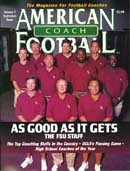Article CategoriesAFM Magazine
|
Win-Win SituationDennis Erickson and Oregon State discover it's nice to be wanted.by: Ron Bellamy The Register-Guard, Eugene, Ore. © More from this issue If it had been a marriage last January - so sudden, so shockingly surprising - the town gossips would have had a field day. Dashing Dennis Erickson, the coach who won two national football championships at Miami, and Oregon State, the ungainly spinster of college football? No way. It can't last, the gossips would have said. Oregon State just got him on the rebound from that nasty mess in Seattle. Gosh, he can't be the desperate, can he? After all the bright lights, and the fame, he'll never be happy in a little town like Corvallis, where the college football team hasn't had a winning season since 1970. Good grief, does he know what he's doing? And yet, as the 1999 college football season drew closer, it was clear that Dennis Erickson knew exactly what he was doing when he picked up the telephone to inquire about the s....The full article can only be seen by subscribers.
|
|
|||||||
| HOME |
MAGAZINE |
SUBSCRIBE | ONLINE COLUMNISTS | COACHING VIDEOS |
Copyright 2026, AmericanFootballMonthly.com
All Rights Reserved





